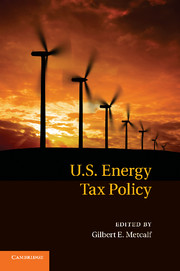Book contents
- Frontmatter
- Contents
- Conference Participants
- 1 Introduction
- 2 Distributional Impacts of Carbon Pricing Policies in the Electricity Sector
- 3 Distributional Impacts of a U.S. Greenhouse Gas Policy
- Comments
- 4 Instrument Choice Is Instrument Design
- 5 Taxes, Permits, and Climate Change
- 6 Border Adjustments for Carbon Taxes and the Cost of Emissions Permits
- 7 Taxes and Caps as Climate Policy Instruments with Domestic and Imported Fuels
- 8 How Much Should Highway Fuels Be Taxed?
- 9 State Tax Policy and Oil Production
- 10 The Social Costs and Benefits of U.S. Biofuel Policies with Preexisting Distortions
- Index
- References
Comments
Published online by Cambridge University Press: 01 June 2011
- Frontmatter
- Contents
- Conference Participants
- 1 Introduction
- 2 Distributional Impacts of Carbon Pricing Policies in the Electricity Sector
- 3 Distributional Impacts of a U.S. Greenhouse Gas Policy
- Comments
- 4 Instrument Choice Is Instrument Design
- 5 Taxes, Permits, and Climate Change
- 6 Border Adjustments for Carbon Taxes and the Cost of Emissions Permits
- 7 Taxes and Caps as Climate Policy Instruments with Domestic and Imported Fuels
- 8 How Much Should Highway Fuels Be Taxed?
- 9 State Tax Policy and Oil Production
- 10 The Social Costs and Benefits of U.S. Biofuel Policies with Preexisting Distortions
- Index
- References
Summary
As the Washington policy process grinds forward, it is essential to examine the distributional impacts of efforts to put a price on CO2 emissions. As the authors of this impressive chapter note, questions of “who gets what and who pays” are often more important to legislative victories than the efficiency issues that are traditionally of greatest concern to economists. Rausch and colleagues apply their modeling skills to analyzing the impacts of a national cap-and-trade system of the type contained in the American Clean Energy and Security Act of 2009 (H.R. 2454). They focus on two critical household-level impacts: income class and region.
Most previous analyses have examined distributional effects purely on the basis of the energy expenditures of households. In contrast, Rausch and colleagues employ a general equilibrium framework to trace the effect of a new policy on the cost of all goods and services, and returns to capital and other resources, including labor. The analysis is based on the static MIT U.S. Regional Energy Policy (USREP) model, and represents a first phase toward developing a dynamic model consistent with the MIT's global Emissions Prediction and Policy Analysis (EPPA). This welcome advance offers sectoral detail, production structure, and other key parameters that are similar to EPPA. By restricting their focus to the United States and introducing household heterogeneity in lieu of a representative agent approach, they are able to generate explicit modeling of regions and states within the United States, and multiple household income classes in each region.
- Type
- Chapter
- Information
- US Energy Tax Policy , pp. 108 - 112Publisher: Cambridge University PressPrint publication year: 2010



